第一部分 必修一 Unit4 Earthquakes
第一部分 必修1 Unit 4 Earthquakes

6.__s_u_f_fe_r_i_n_g__ n.苦难;痛苦→___s_u_ff_e_r_ vt.& vi.遭受;忍受; 经历→___su_f_f_e_re_r__ n.患者;受难者
7.___e_x_tr_e_m__e__ adj.极度的→___e_x_tr_e_m_e_l_y_ adv.极其;非常 8.__in_j_u_re__ vt.损害;伤害→__i_n_j_u_re_d_ adj.受伤的→___in_j_u_r_y_ n.伤害,损害;受伤 9.__s_u_r_v_iv_o_r__ n.幸存者;生还者;残存物→__s_u_r_v_iv_e_ vt.& vi. 幸存;存活下来→___su_r_v_i_v_al_ n.生存;存活;幸存 10.__d_e_s_t_ro_y__ vt.破坏;毁坏;消灭→___d_e_s_t_ro_y_e_rn.破坏者; 毁灭者→___d_es_t_ru_c_t_io_n__ n.破坏;毁灭
单句语法填空 1.(2017 年新课标Ⅱ卷·语法填空)Steam engines ___w_e_r_e_u_s_e_d (use) to pull the carriages. 2.Thousands of soldiers were sent there to rescue those __tr_a_p_p_e_d__ (trap) in the building. 3.(2018 年北京卷·阅读理解 A)One of my ankles was __in_j_u_r_ed
13.____re_s_c_u_e__ n.& vt.援救;营救→____re_s_c_u_e_r_ n.救援者 14.___t_r_ap___ vt.使陷入困境 n.陷阱;困境 15.__e_le_c_t_ri_c_it_y__ n.电;电流;电学→____e_l_e_c_tr_ic___ adj.电的; 带电的→____e_l_e_c_tr_ic_a_l__ adj.用电的;与电有关的 16.____d_is_a_s_te_r____ n.灾难;灾祸 17.___b_u_ry___ vt.埋葬;掩埋;隐藏
高中英语人教版必修一Unit4《Earthquakes》教案

Unit 4 Earthquakes1.Knowledge:Learn and master the new words and expressions in this period.Words:Ability:1.Train the students’ listening ability.2.train the students’ listening ability.3.Train the students’ ability to use the Internet to search for some usefulinformation.4.Train the students’ ability to cooperate with others.Emotion:1.Know the damage that an earthquake2.Know the ways to reduce the losses of an earthquake.Teaching important pointsTrain the students’ speaking ability by describing, talking and discussion. Difficulties:Train the students’ listening ability.Step1 Warming-upT:Do you know what happened in the Indian Ocean at the end of last year? It shocked or we can say frightened the whole world.S: A terrible tsunami broke out there on 26th December. More than 200 000 people were killed.T: Yes. It is said that it is the biggest in the fore decades. A tsunami is an undersea earthquake. Then have you heard of any land earthquakes? Would you please list some? 学.科.S: We can often hear that earthquakes occur in Japan. In 1906, an earthquake struck San Francisco, USA. About 700 people died in the earthquake and the fires. And as many as 250 000 people lost homes.T: But do you know any famous earthquakes that happened in our county?S: The Tangshan Earthquake that happened in 1976.T: Can you tell me what mighty happen in an earthquake? You may look at the two pictures on Page 25.Step 2 ListeningT: Before we learn the passage about an earthquake, let’s first know why there are earthquakes in the world. So let’s do some listening on Page 62. listen to the tape for the first time and try to get a general idea of the passage.Listen to the tape and check the answers.( It is about the cause of earthquakes and how we can reduce losses from them.)T: Listen to the tape for the second time and judge whether the statements in Part 1 are true of false.T: Let’s check the answers. Listen again and try to correct the statements that are false.T: Listen again and try to complete the table in Part 2.A few minutes later, check the answers. 学,科,网Z,X,X,K]Step 3 Homework1.Preview the reading passage on Page 26 and do exercise I in the part “Learningabout language”.2.Ask the to look for more ways of reducing losses from earthquakes. The studentscan go to the library or use the Internet to search for information. After searching for the information, each group should make a poster, informing people how to reduce the losses of an earthquake. 学_科_网Z_X_X_K]Record after teaching :_____________________________________________________________________ _____________________________________________________________________ _____________________________________________________________________ _____________________________________________________________________ _____________________________________________________________________ _____________________________________________________________________ _____________________________________________________________________ _____________________________________________________________________ _____________________________________________________________________The Second PeriodKnowledge:Learn some new, phrases and some new sentence patterns.Ability:1.learn some detailed information about an earthquake.2.improve the students’ reading ability.3.train the students’ ability to grasp key information while listening.4.train the students’ speaking ability.Emotion:1.Train the students’ ability to cooperate with others.2.Know the deadliness of an earthquake and the signs before an earthquake iscoming.3.Learn from the bravery of people in Tangshan to face the reality and rebuild thecity.Teaching important points:1 The new words and expressions.2. Learn some detailed information about an earthquake.3. Train the students’ ability to cooperate with others.4. Train the students’ speaking ability.Teaching difficulties:1 Words: shake, burst, rise, destroy, shock, fresh, injure2. Phrases: right away, at an end3. Sentence patterns:(1) It seemed/ seems that…(2) The number of sb./sth. Reached/reaches…(3)All hope was not lost.4. Improve the students’ reading ability.5. Train the students’ ability to grasp key information while listeningTeaching procedures:Step 1 Pre-readingT: Suppose you are warned of a coming earthquake. Now you have time to take only one thing. Tell your partner what you will take and the reason.T: If an earthquake is around the corner, there must be some abnormal phenomena. Carefully look at the four pictures on Page 25 and try to describe what you have seen. Step2 ListeningT: Everyone knows that an earthquake is very terrible. Today, we will learn something about the strongest earthquake in China’s history, which happened in Tangshan, Hebei, in 1976. First listen to the tape with your textbooks closed and check whether the following statements are true or false. If it is false, try to correct it.1.People in Tangshan were warned of the earthquake and didn’t go to bed that night.(F)2.People in Beijing also felt the earthquake. (T)3.More than 400 000 people were killed in the quake. (F)4.Many rescue workers and doctors were trapped under the ruins during theaftershock. (T)5.People tried to get fresh water from under the ground in Tangshan. (F)Step 3 Reading1.Finish Part 1-2 in Comprehending on Page 27.2.Finish Part 3 in Comprehending on Page 27.3.Read the passage again to get important information about Tangshan Earthquakeand fill in the blanks. ( 百思英语Page 44 )Step 4 Speaking or Reading aloudIf your students are good at English, ask them to do this exercise:Suppose one of you was a newspaper reporter, and the other was a witness of the 1976 Tangshan Earthquake. Now the newspaper reporter is asking the witness some questions. Work in pairs please.If your students are very poor in English, ask them to do this exercise:Play the tape for the students to listen and follow in order to let them know how to read the text.Step 5 Homework1.Read the text several times.2.Do exercise 3 on Page 28.3.Do exercise 2 on Page 28 in the exercise book and hang it in tomorrow.4.Learn some words and phrases in this unit and make some sentences with them.( Ss’ Book, Page 82-84)Record after teaching :_____________________________________________________________________ __________________________________________________________________________________________________________________________________________ ____________________________________________________________________ _____________________________________________________________________ _____________________________________________________________________ _____________________________________________________________________ _____________________________________________________________________ _____________________________________________________________________ _ZxxkThe Third PeriodKnowledge:1.words: crack, burst, ruin, injure, destroy, shock, last2.phrases: at an end, right away, dig out3.sentence patterns:All hope was not lost.Ability:1.Train the students’ ability to read different numbers in English.2.Learn the usage of some difficult words and expressions.3.Train the students’ ability to remove the difficulties while reading.Emotion:1.Train the students’ ability to cooperate with others.2.Know the deadliness of an earthquake and the signs before an earthquake iscoming.3.Learn from the bravery of people in Tangshan to face the reality and rebuild thecity.Teaching important points:1.Train the students’ ability to read different numbers in English.2.Train the students’ ability to cooperate with others.Teaching difficulties:1.The explanation of some difficult words and expressions.2.Train the students’ ability to remove the difficulties while reading.Teaching procedures:Step 1 Revision1.T: In the last period , we learned something about the terrible Tangshan Earthquake in 1976, which is the deadliest earthquake in China’s history. Now I am going to ask you some questions based on the Reading passage.(1)What did people in Tangshan see in the sky before the earthquake? 学|科|(2)What did people notice in the wells?(3)Did people pay any attention to these abnormal phenomena?(4)When did the earthquake begin?(5)Were there any aftershocks?(6)Did the survivors deny the city and go to live in other places?2. Check the homework (Ex2 on P28). Ask them to recite it after class.Step 2 Learning about NumbersTurn to Page 28 and look at Part 3. Match each word to the number that has the same meaning. Allow the students several minutes to finish the task. Check the answers. Step 3 Important pointsAsk the students to turn to Page 82. Ask some students to make some sentences with the words or phrases. Deal with some difficulties. You can add more phrases.Step 4 homeworkIn order to master the usage of these words and expressions, please do some related exercises.1.Finish off the two parts in Using Words and Expressions on Page 63.2.Translate the sentences on Page 63 into English. Write the English sentences inone of your exercise book and hand it in tomorrow.Record after teaching :_____________________________________________________________________ _____________________________________________________________________ _____________________________________________________________________ _____________________________________________________________________ _____________________________________________________________________ _____________________________________________________________________ _____________________________________________________________________ _____________________________________________________________________ _____________________________________________________________________The Fourth PeriodKnowledge: ZXXK]1.Learn the Attributive Clause.2.Learn the difference between Relative Pronouns for the Attributive Clauses. Ability:1.Learn to choose the correct Relative Pronouns for the Attributive Clauses.2.Train the students’ ability to report what others have said.Emotion;Train the students’ ability to cooperate with each other.Teaching important points:1.Learn the Attributive Clause.2.Train the students’ ability to report what others have said.Teaching difficulties:Learn to choose the correct Relative Pronouns for the Attributive Clauses.Teaching procedures:Step 1 revisionCheck the homework exercises.Step 2 Grammar( The teacher writes the sentence “ Workers built shelters for survivors whose homeshad been destroyed.” On the blackboard before class begins.)T: Please look at the sentence on the blackboard, paying special attention to the underlined part. What kind of clause is it?Ss: The Attributive Clause.T: Yes. The Attributive Clause tells us which person or thing (or what kind of person or thing ) the speaker means.e.g. The woman who lives next door is a teacher.A sen tence with an attributive clause contains two shorter sentences. In the sentence above, the two short sentences are: “The woman is a teacher.”And “The woman lives next door.” The Attributive Clause is the answer to the question: Which woman is a teacher?Would you try to divide the sample sentence on the blackboard into two short sentences?T: That’s right. Now try to find all the sentences with Attributive Clauses in the reading passage and divide each sentence into two short sentences.T: Next I will say s omething about the common relative pronouns.“Who”is used for people. “Which”is used for things. “That” is used for things or people. “Whose” is used instead of his/her/their/somebody’s. “Whom” is quite formal, and in most cases it is all right to use who instead. But when whom has a preposition before it, it cannot be replaced by who.Ste p 3 Practice1. Now look at Part 2 in Discovering Useful Structures on Page 28. try to complete each sentence using that, which, who, or whose.Let the students do this exercise and check the answers.2.Do more exercises in Ex 3 on Page51 in《导学》Step 4 HomeworkAfter class, read the passage on Page 64. It’s about advice on how to protect your home from an earthquake. Complete the sentences below, using who, whom, which, that or whose.Record after teaching;_____________________________________________________________________ _____________________________________________________________________ _____________________________________________________________________ _____________________________________________________________________ _____________________________________________________________________ _____________________________________________________________________ _____________________________________________________________________ _____________________________________________________________________ _____________________________________________________________________ .The Fifth PeriodKnowledge:1.Know how to write a speech.2.Know how to write a newspaper story.Ability:1.Train the students’ speaking ability.2.Train the students’ ability to search for doing something.3.Train the students’ ability to do things step by step.Emotion:1.Honor the great people of Tangshan.2.Learn to cooperate to each other.Teaching Important Points:1.Train the students’ speaking ability.2.Train the students’ ability to search for doing something.Teaching Difficulties:1.Know how to write a speech.2.Know how to write a newspaper story.3.Learn to cooperate to each other.Teaching Procedures:Step 1 RevisionT: In the last period, we learned the Attributive Clause and how to choose a proper relative pronoun. Now let’s check your homework exercises. Please open your textbooks and turn to Page 64. Look at Part 1 in Using Structures. I will ask some of you to read the sentences out.(The teacher corrects mistakes if there are any.)Step 2 Readi ng and WritingT: Read the letter on Page 29.In the blank at the beginning of the letter, write the last number of the year it is now. Then in the blank near the end of the letter, use a number to say how many years ago the quake happened.(After several minutes, the teacher checks the answers with the class.)T: Suppose you are the student who was invited to give the speech. What should you include in your speech?(Students give their different answers.)T: Y es, while writing, don’t forget to contain the information. Now I will give you 15 minutes to write the speech. You can follow the points in part 3 on this page. (While the students are writing, the teacher gets around the classroom and helps the students to deal with any difficulties that they have.)(After 15 minutes)T: Are there any volunteers to read his or her speech?( If there is nobody, the teacher asks one to read, and give some assessments.)Step 3 SpeakingT: Imagine that after your speech, Zhangsha asks you to give a short talk about the new stamps about Tangshan to honor the city. First, ask and answer the following questions in pairs.(1)What do these stamps show?(2)Do you think these stamps are very important and why?(3)Will you collect these stamps? Why and why not?(After the students ask and answer these questions in pairs.) 学科T: Now try to fill in the lines in the little talk. You can use some of the answers to the questions.T: Next I will ask one of you to read the little talk.Step 4 WritingT: By now you have learned writing a speech and a little talk. Now you are going to write an article for a newspaper about a special event that happed in your hometown. First, let’s learn some skills of writing news paper stories. Before you write, you should write an outline. This is very useful. Today, we will learn how to write an outline. Please turn to Page 31. Read the instructions in bold and pay attention to some questions I prepared to you.Q1: Why is an outline important?Q2: What should an outline include?Q3: Why is a headline important?Q4: What are the steps to finish a newspaper story?Q5: What is the feature of a newspaper story?Suggested answers:1.Because an outline will prepare you to write a better story.2. A good outline should have a headline, a list of main ideas and a list of importantdetails.3. A headline can tell the readers what the topic is, so it can attract the readers’attention since the reader may not have bought the newspaper before they read the headline.4.First, organize the main ideas. Next, put some details into each paragraph.5. A newspaper stor y gives the most important news first and the least importantnews last.T: Now let’s read the example of a newspaper story. Try to find the headline, main idea and details of each paragraph. You may work in groups of three.(After several minutes, the teacher asks the students the following questions :)Q1: What is the headline of the newspaper story?Q2: What is the main idea?Q3: What is the detailed information?T: Now turn to Page 32 and check your main ideals and detailed information.Step 5 HomeworkT: So now you know how to write a passage step by step. Prepare the outline for a short newspaper story for China Daily. Use the example to help you to organize your outline. You can first have a discussi on with your partner and decide which event you will write about. Try to write down the title, main ideas and detailed information. Then put them into a short passage.ZXXK]Record after teaching:_____________________________________________________________________ _____________________________________________________________________ __________________________________________________________________________________________________________________________________________ _____________________________________________________________________ _____________________________________________________________________ _____________________________________________________________________ _____________________________________________________________________ _____________________________________________________________________The Sixth PeriodKnowledge:Learn a passage about the San Francisco EarthquakeAbility:1. Learn to compare two similar passages.2. Train the students’ listening ability.Emotion:1. Learn to cooperate with others.2. Learn from the bravery of the people of San Francisco to face the reality. Teaching Important Points:1.Train the students’ listening ability.2. Learn a passage about the San Francisco EarthquakeTeaching Difficulties:Learn to compare two similar passages.Teaching Procedures:Step 1 RevisionT: In the second period of this unit, you learnt some detailed information about the Tangshan Eearthquake. Can you use several sentences to summarize the passage? S: Let me have a try. The terrible earthquake struck the city of Tangshan while people were sleeping. More than 400 000 people were killed or injured in the quake. After the quake, people found nearly everything was destroyed. But people in Tangshan didn’t lose heart. They rebuilt the city with the help of soldiers.T: Quite good. ZxxkStep 2 Reading and ComparingT: In the first period, we also talked about the earthquakes that happe ned in San Francisco. Today, we will learn a passage titled “The Story of an Eyewitness”, which is about the San Francisco Earthquake in 1906. It was written by Jake London, who was a famous American writer.T: First read the passage carefully. While reading, please think about the following questions:(1)How did the author feel about the earthquake?(2)How did the author feel about the people of San Francisco?(Ss read the passage, then the teacher asks someone to give their answers and checks the answers)(Answers will vary.)T: Quite good. You can keep your own answers as long as you think they are reasonable and you can find proofs from the passage.Read the first paragraph in this passage .Then go back and read again the first paragraph of the passage on Page 26. Compare the ways both writers give you details about the earthquakes. Try to finish the 4 exercises on Page 66. You may discuss i n group of three.(Ss read the two passage and finish the exercises.)(Then the teacher checks the answers.)T: Next I will play the tape of this passage for you to listen. Please pay special attention to the intonation.(After listening.)T: Now I will give you several minutes to read the third paragraph with feelings. Step 3 ListeningT: Just now we learned a passage written by an eyewitness about the terrible San Francisco earthquake in 1906. Now we will listen to a story told by a man who was a survivor of the earthquake. Listen to the tape the first time, and try to tell whether the statements in part 1 are true or false.(Teacher plays the tape for the students to listen and finish the task.)(After listening, the teacher checks the answers with the class.)T: Now let’s listen to the tape again and try to answer the questions in Part 2.(After listening, the teacher checks the answers) ZXXK]T: While listening to the tape, you should not only pay attention to the contents, but also the pronunciation and intonation. The sentences in Part 3 show us the sequence. I will play the tape again, you should mark liaison and incomplete explosion in these sentences. Then practice reading them aloud.Step 4 HomeworkT: In this class we read and listened to two stories ,both of which are about the 1906 San Francisco earthquake. The stories are true and were written for the Museum of the City of San Francisco. The museum has many such personal accounts and photos at /1906/06.html. If you are interested in them, you can surf in the site I’ve given to you.Record after teaching:_____________________________________________________________________ _____________________________________________________________________ _____________________________________________________________________ _____________________________________________________________________ _____________________________________________________________________ _____________________________________________________________________ _____________________________________________________________________ _____________________________________________________________________ _____________________________________________________________________The Seventh PeriodKnowledge:1.Learn how to make an earthquake plan.2.Learn what to contain in a personal earthquake bag.Ability:1.Train the students’ listening abil ity.2.T rain the students’ speaking ability.3.Learn to find reasons for their choices.4.Learn to sum up what they have learned in the unit.Emotion:Learn to coop erate with others.Teaching Important Points:1. Train the students’ listening ability.2. Tra in the students’ speaking ability.Teaching Difficulties:Learn to find reasons for their choices.Teaching Procedures:Step 1 GreetingsGreet the whole class as usual.Step 2 ListeningT: These days Earthquakes are always our central topic. We have learned many things about it. Up till now, earthquakes are difficult to predict. We can hardly avoid an earthquake. But actually we can do things to reduce the losses of an earthquake. Let’s look at the form on Page 66 and have a discussion about the earthquake plan with your partner.( Ss give their answers)T: What should you do if you are outside?(Ss give their answers)T: What should you do if you are in the living room?(different answers)T: What should you do if you are in the house room?(different answers)T: Next we are going to listen to the tape and write down the three “things” that are mentioned.(After listening, teacher checks the answers with the students.)T: Then let’s listen again. This time you should write down more details about each of th e “things”.(After listening, teacher checks the answers with the class. Play the tape again if necessary.)Step 3 SpeakingT: You know every family should have an earthquake bag, in which there are enough things that you can use in case of an earthquake. Here we have a list of possible items for the personal earthquake bag. Choose only eight things, which you think are the most essential, from the list. They must last you five days. Discuss with your partner.(After several minutes.)T: Now join another pair and discuss your choices. Put all the things you agree on into a final list. Discuss the other items explaining your reasons and trying to agree which ones are the most suitable.(After several minutes.)T: Each group should choose one representative. Now be prepared to present your list to the class and give your reasons for each choice.Step 4 Learning TipT: In order to learn a language well, you should do a lot of practice, including listening, speaking, reading and writing. Only when we understand what is said to us can we have a conversation with somebody. So listening to English is very important. After class, you should listen to the English news on CCTV International. You will not only get a lot of information about what is happening around the world, but also improve your listening and learn more English words and expressions. At the same, you will improve your pronunciation and intonation.Step 5 Summing upT: Now let’s sum up what you have learnt in this unit. Work with your partner. First write down what you have learned about earthquakes. Then write down the verbs, nouns, expressions and new grammar items that you have learned from this unit. Step 6 Homework1.Review Unit 4. .2.Preview Unit 5.Record after teaching:_____________________________________________________________________ _____________________________________________________________________ _____________________________________________________________________ _____________________________________________________________________ _____________________________________________________________________ _____________________________________________________________________ _____________________________________________________________________ _____________________________________________________________________ _____________________________________________________________________The End。
高一(上)英语必修一Unit4_Earthquakes重点单词短语归纳整理
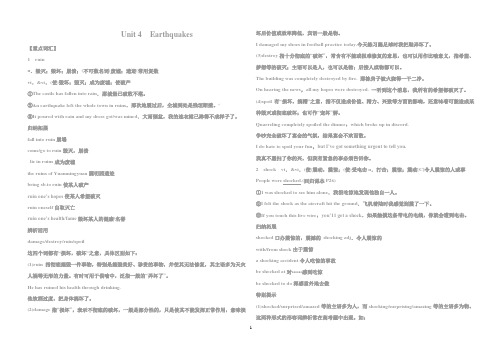
Unit 4 Earthquakes【重点词汇】1 ruinn.毁灭;毁坏;崩溃;(不可数名词)废墟;遗迹(常用复数vt.&vi.(使)毁坏;毁灭;成为废墟;使破产①The castle has fallen into rain.那城堡已破败不堪。
②An earthquake left the whole town in ruins.那次地震过后,全城到处是残垣断壁。
…③It poured with rain and my dress got/was mined.大雨倾盆,我的连衣裙已淋得不成样子了。
归纳拓展fall into ruin崩塌come/go to ruin毁灭,崩溃lie in ruins成为废墟the ruins of Yuanmingyuan圆明园遗迹bring sb.to ruin使某人破产ruin one‟s hopes使某人希望破灭ruin oneself自取灭亡ruin one‟s health/fame毁坏某人的健康/名誉辨析活用damage/destroy/ruin/spoil这四个词都有“损坏,破坏”之意,具体区别如下:(1)ruin指彻底摧毁一件事物,特别是摧毁美好、珍贵的事物,并使其无法修复,其主语多为天灾人祸等无形的力量。
有时可用于借喻中,泛指一般的“弄坏了”。
He has ruined his health through drinking.他饮酒过度,把身体搞坏了。
(2)damage指“损坏”,表示不彻底的破坏,一般是部分性的,只是使其不能发挥正常作用,意味损坏后价值或效率降低,宾语一般是物。
I damaged my shoes in football practice today.今天练习踢足球时我把鞋弄坏了。
(3)destroy指十分彻底的“破坏”,常含有不能或很难修复的意思,也可以用作比喻意义,指希望、梦想等的破灭;主语可以是人,也可以是物;后接人或物都可以。
人教版高一英语必修一unit4知识点、练习及答案
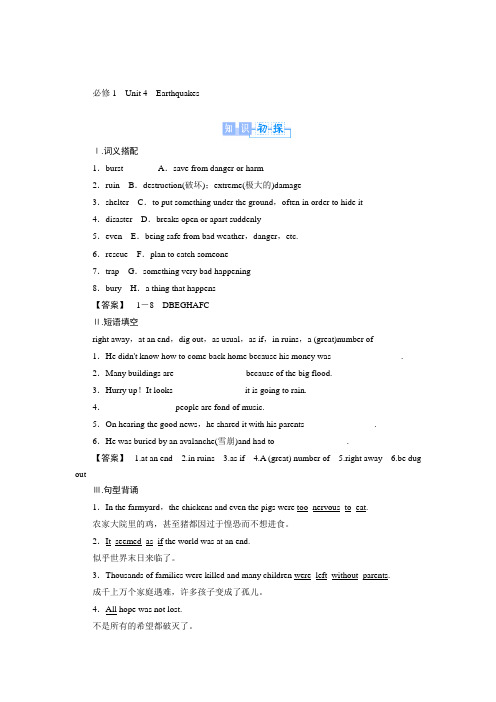
必修1 Unit 4EarthquakesⅠ.词义搭配1.burst A.save from danger or harm2.ruin B.destruction(破坏);extreme(极大的)damage3.shelter C.to put something under the ground,often in order to hide it4.disaster D.breaks open or apart suddenly5.even E.being safe from bad weather,danger,etc.6.rescue F.plan to catch someone7.trap G.something very bad happening8.bury H.a thing that happens【答案】1-8DBEGHAFCⅡ.短语填空right away,at an end,dig out,as usual,as if,in ruins,a (great)number of1.He didn't know how to come back home because his money was________________.2.Many buildings are ________________because of the big flood.3.Hurry up!It looks ________________it is going to rain.4.________________people are fond of music.5.On hearing the good news,he shared it with his parents________________.6.He was buried by an avalanche(雪崩)and had to ________________.【答案】 1.at an end 2.in ruins 3.as if 4.A (great) number of 5.right away 6.be dug outⅢ.句型背诵1.In the farmyard,the chickens and even the pigs were too_nervous_to_eat.农家大院里的鸡,甚至猪都因过于惶恐而不想进食。
人教版高中英语必修一课件:Unit 4 Earthquakes(共46张PPT)
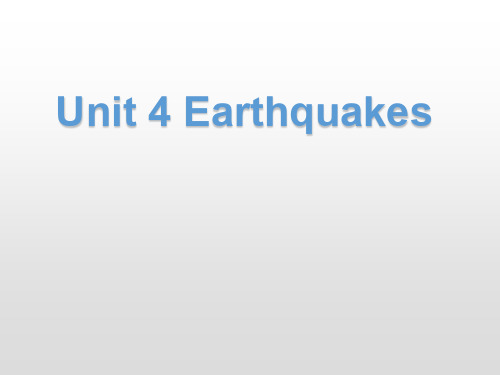
The world seemed at an end. Everything was destroyed.
__T_h__o_u_s_a_n__d_s_o__f__ families were killed and many children were left without parents.
Signs before the earthquake:
The water _____ in some buildings _p_ip_e_s__ and cracked _____b_u.rst
break
Part 2 Ruins
The damages caused during the earthquake.
After the earthquake
_s_e_n__t soldiers to Tangshan to
The
army:
rescue workers;
o_r_g_a_n_i_ze_d_ teams
to
_d_i_g__o_u_t
those who were trapped and to
bury the dead.
Part 3 (Para 4)
After the earthquake
rescue
Before the earthquake
sign
During the earthquake
damage
Structure of the whole passage :
order of the passage
time order
Disaster: A big earthquake
英语必修一Unit 4 Earthquakes词汇句子解析
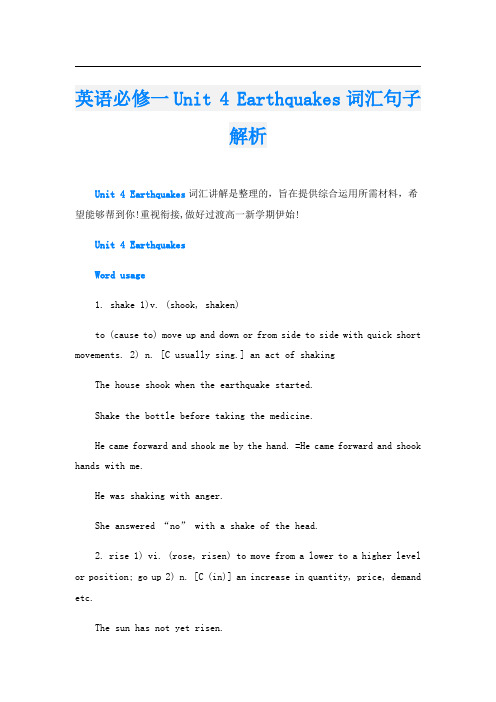
英语必修一Unit 4 Earthquakes词汇句子解析Unit 4 Earthquakes词汇讲解是整理的,旨在提供综合运用所需材料,希望能够帮到你!重视衔接,做好过渡高一新学期伊始!Unit 4 EarthquakesWord usage1. shake 1)v. (shook, shaken)to (cause to) move up and down or from side to side with quick short movements. 2) n. [C usually sing.] an act of shakingThe house shook when the earthquake started.Shake the bottle before taking the medicine.He came forward and shook me by the hand. =He came forward and shook hands with me.He was shaking with anger.She answered “no” with a shake of the head.2. rise 1) vi. (rose, risen) to move from a lower to a higher level or position; go up 2) n. [C (in)] an increase in quantity, price, demand etc.The sun has not yet risen.The population of the city has risen to five million.He rose and left the room.There will be a rise in unemployment next year.Theres been a sharp rise in the cost of living.2. pond n. an area of still water smaller than a lake, especially one that has been artificially madeSome cattle were drinking at the pond.There are some fish living in the pond.When an earthquake is coming, fish will jump out of ponds.3. burst 1) v. to (cause to ) break open or break apart suddenly and violently, usually as a result of pressure from within and often cause the contents to become widely scattered.2) n. an act of result of bursting; (of) a sudden short period of great activity, loud noise, strong feeling; outbreakThe balloon burst.After ten days of rain the river burst its banks.A burst of hand-clapping followed the ending of the song.4. canal n. an artificial stretch of water dug in the ground to allow ships or boats to travel alongit, or to bring water to or remove water from an areaCoal used to be sent here by canal.Canals have been built to irrigate the desert.The Panama Canal joins two oceans.5. steam n. [U] 1) water in the state gas produced by boiling2) power or effort produced by steam under pressure, and used for making things work or moveWho invented the steam engine?Steam was used to be the power of a train.There is steam bursting from that hole.6. ruin 1. n. a) [U] the cause or state of destruction and decayb) [C] a building that has been badly damaged or destroyed2. vt. a) to spoil or completely destroy a person or thingb) to cause someone to loss all their moneyThe temple has fallen into ruin.We visited the ruins of the temple.The heavy rain ruined our holiday.The hurricane ruined all the houses here.The flood ruined the crops.If I lose my lawsuit(官司), the cost will ruin me.7. injure vt. to cause physical harm to (a person or animal), especially in an accident; hurt seriously; to damageI hope I didnt injure her feelings.His back was injured.Two people were killed and seven were injured.His reputation will be badly injured by the vicious rumour.8. destroy vt. to damage sth so severely that it can not be repaired; put an end to the existence of; ruinA fire destroyed the house.What he said destroyed our last hope.All hopes of peaceful settlement were destroyed by his speech.9. brick n. [C,U] 1) a hard piece of baked clay used for building2) sth. in the shape of a brickThey used yellow bricks to build the house.The tower is made of bricks.Bricks covered the ground like red autumn leaves.10. useless adj. not of any useThis knife is so blunt. Its useless.I realized it was useless to reason with him.I was useless at maths. = My maths is very poor.11. shock 1) n. a) [C, U] a violent force from sth such as explosion,a crash or a hard blowb) [C, U] the feeling you get after sth unexpected and usually very unpleasant has suddenly happened, or you have received an unexpected piece of newsc) the poor medical condition of someone who has an accident and whose heart and lungs are not working properly2) v. to make someone feel very upset, angry, or unpleasantEarthquake shocks are often felt in Japan.The news of his death was a shock to us.The traffic accident sent him into a state of shock.They were shocked by her rudeness.We were shocked by his sudden death.12. rescue v. to save someone or sth from harm or dangerHe rescued three children from the burning building.The life boat was sent out to rescue the sailors from the sinking ship.The boy was rescued after hours at sea.13. disaster n. [C,U] a sudden event causes great loss or harmWe were all shocked by the disaster.The earthquake is one of the worst natural disasters the country has ever suffered. People began to wonder how long the disaster would last.14. organize v. to plan and arrange an event; to arrange things ina sensible orderWell organize an oral English contest.The story is very well organized.They organized the truckers into a union.15. shelter 1) n. a) [U] protection, especially from bad weather or danger b) a building that protects you from weather or danger.2) vt. to protect someone or sth from bad weather or danger;vi. to stay in a place in order to be protected from bad weather or dangerThe umbrella is a poor shelter from heavy rain.Their immediate need is for food, clothing and shelter.The wall sheltered us from the wind.She was accused of sheltering a murderer.She wad sheltered by the USA.In the rain people were sheltering in the doorways of shops.16. fresh adj. 1) new and different (only before a noun ); 2) recently picked, caught, produced and therefore in good condition (used of food);3) clean, cool and pleasantThey buy fresh meat.This kind of fish lives in fresh water.She is fresh from university.She is quite fresh to office work.17. percent n. parts for each 100The bank has increased its interest rate by one percent.Over ninety percent of the islanders here are illiterate.He spends a large percent of his income on food and drink.18. speech n. 1) [C] a formal talk to a group of listeners2) [U] the ability to speak or the act of speaking3) [U] way of speakingThe chairman made an opening speech.She is researching speech development in children.We express our thoughts by speech.By your speech I can tell youre from Hong Kong.19. judge 1) vi. vt. to decide who or what is the winner in a competition2) [vt. + that] to form or give an opinion about someone or sth after careful thoughtjudging from, judging by…3) n. a public official who has the power to decide questions brought before a court of law; a person who has the knowledge and experience to give an opinion about the value of sthYou cant judge a book by its cover.He is going to judge the first race.We must judge whether he is guilty.The prisoner was taken before the judge.He was one of the judges at the horse race.20. honour 1) n. a) [U] great respect and admirationb) [sing] sth that brings great respect and pride2) v. to show respect to sb. or to praise sb. publiclyWe fight for the honor of our country.He is an honor to our school.Children should be taught to show honor to their elders.He honors his teachers.20. prepare 1) vt. to make sth. ready for a future event or action 2) vi. to get ready to do sth.They prepared themselves for the worst.When we arrived home, mother had already prepared dinner for us.I was preparing for bed when I heard a knock at the door.Useful expressions1. right awayat once ; in no time; immediatelyI will return the book right away.I am getting in touch with him right away.We are about to start right away.2. end1) at an endfinish; overIt seems that the world was at en end.2) bring… to an end =put an end to…I wonder how I can bring the dispute to an end.=I wonder how I can put an end to the dispute.3) come to an endThe meeting came to an end at midnight.4) at the end of…At the end of the road there is a shop.5) by the end of…How many English words have you learned by the end of last term?6) in the end =at last; finallyHe will be a scientist in the end.3. dig out1) to get sth out of a place, using a spade or your hands2) to find sth you have not seen for a long time, or that is not easy to findLets dig out the roots.Why did you dig out all those old magazines?We must dig the truth out of him.1. a (good \ great \ large) number of+ n.(pl.)many; a large quantity of; a lot ofA good number of students are not interested in modern art.Ive seen the film a number of times.The Great Wall attracts a great number of foreign tourists every day.the number of…The number of private colleges has increased.= Private colleges have increased in number.5.give out1) to give sth to a number of different people, especially to give information to people2) to produce light, heat, a sound, a gas, smell etcYou have no right to give my telephone number out.Students were giving out leaflets(传单)to everyone on the street.The teacher gave out the examination papers.The radiator (散热器) is giving out a lot of heat.与give有关的常用短语还有:give away 送掉,捐赠give in 让步,屈服give off 发出(气味、光、热、声音等),此时相当于give outgive up放弃give back 归还6.thousands of基数词+s,并不表示确切的具体数字,可以单独使用,也可以先接介词of 再接复数名词。
人教版高中英语必修一高中一年级()Unit4Earthquakes(含答案解析及听力mp3)
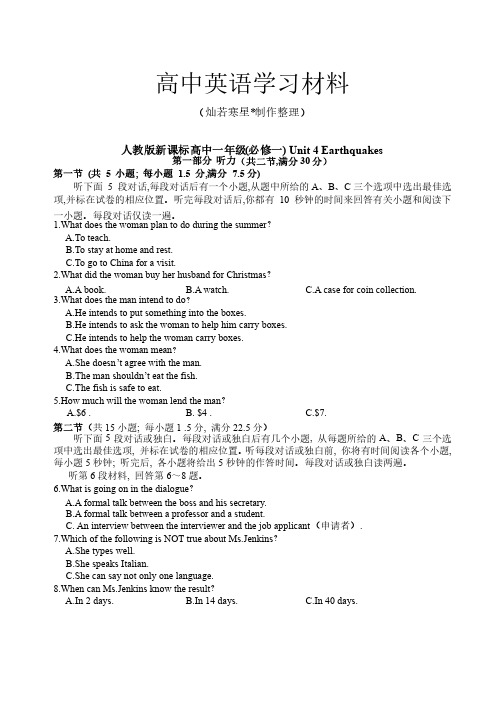
高中英语学习材料(灿若寒星*制作整理)人教版新课标高中一年级(必修一) Unit 4 Earthquakes 第一部分 听力(共二节,满分30分) 第一节 (共 5 小题; 每小题 1.5 分,满分 7.5分)听下面听下面5 段对话,每段对话后有一个小题,从题中所给的A 、B 、C 三个选项中选出最佳选项,并标在试卷的相应位置。
听完每段对话后,你都有你都有10 秒钟的时间来回答有关小题和阅读下一小题。
每段对话仅读一遍。
一小题。
每段对话仅读一遍。
1.What does the woman plan to do during the summerA.To teach.B.To stay at home and rest.C.To go to China for a visit. 2.What did the woman buy her husband for Christmas ?A.A book.B.A watch.C.A case for coin collection. 3.What does the man intend to doA.He intends to put something into the boxes.B.He intends to ask the woman to help him carry boxes.C.He intends to help the woman carry boxes. 4.What does the woman mean ?A.She doesn A.She doesn’’t agree with the man.B.The man shouldn B.The man shouldn’’t eat the fish.C.The fish is safe to eat. 5.How much will the woman lend the man ?A.$6 .B. $4 .C.$7. 第二节(共15小题; 每小题1 .5分, 满分22.5分)分) 听下面5段对话或独白。
高中英语必修知识1《Unit4Earthquakes》教案人教版
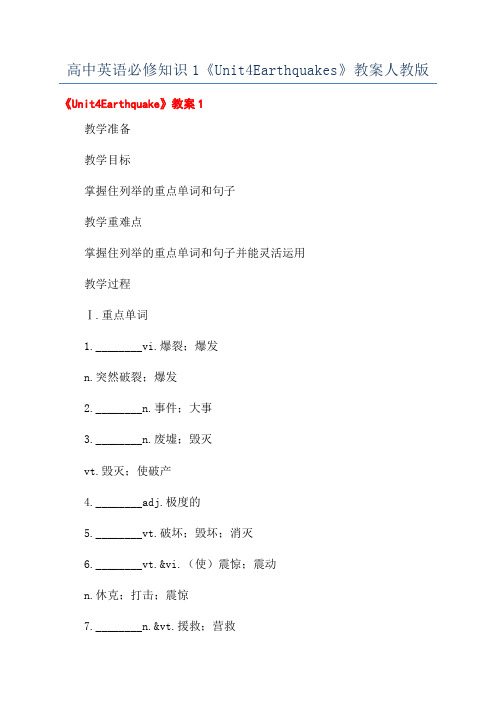
高中英语必修知识1《Unit4Earthquakes》教案人教版《Unit4Earthquake》教案1教学准备教学目标掌握住列举的重点单词和句子教学重难点掌握住列举的重点单词和句子并能灵活运用教学过程Ⅰ.重点单词1.________vi.爆裂;爆发n.突然破裂;爆发2.________n.事件;大事3.________n.废墟;毁灭vt.毁灭;使破产4.________adj.极度的5.________vt.破坏;毁坏;消灭6.________vt.&vi.(使)震惊;震动n.休克;打击;震惊7.________n.&vt.援救;营救8.________vt.使陷入困境n.陷阱;困境9.________n.灾难;灾祸10.________vt.埋葬;掩埋;隐藏11.________n.&vt.损失;损害12.________n.裁判员;法官vt.断定;判断;判决13.________vt.损害;伤害→________n.伤害;损害→________adj.受伤的14.________n.电;电流;电学→________adj.用电的;带电的→________adj.与电有关的;电学的15.________vt.使惊吓;吓唬→________adj.受惊的;受恐吓的→________adj.令人恐惧的16.____________n.祝贺;(复数)贺词→_____________vt.祝贺Ⅱ.重点短语1.a(great)number________许多;大量的2.dig________掘出;发现3.________anend结束;终结4.right________立刻;马上5.a________仿佛;好像6.________ruin严重受损;破败不堪7.thinklittle________轻视,满不在乎8.ten________thouandof数以万计9.beproud________以……自豪10.judge________从……判断11.betrapped________陷入12.beburied________埋头于13.put________helter搭建避难所14.getaway________离开15.payattention________注意Ⅲ知识点教案E某.2OneeingJayChowappearonthetage,theaudienceburtout_________(cheer).burtwithanger/joy勃然大怒burtn.突然破裂;爆发aburtoflaughter一阵笑声2.n.废墟,遗迹(常用复数形式);毁灭be/lieinruin成为废墟;严重受损;破败不堪E某.1Allthetownwere/layin_____(ruin)aftertheearthquake. vt.毁灭;使破产ruinoneelfruinone’health/fame/futureE某.2过量吸烟损害健康,因此你应该戒烟。
- 1、下载文档前请自行甄别文档内容的完整性,平台不提供额外的编辑、内容补充、找答案等附加服务。
- 2、"仅部分预览"的文档,不可在线预览部分如存在完整性等问题,可反馈申请退款(可完整预览的文档不适用该条件!)。
- 3、如文档侵犯您的权益,请联系客服反馈,我们会尽快为您处理(人工客服工作时间:9:00-18:30)。
一、考纲词汇识记 1. burst vi. . n. 2. ruin n. . vt. 3. extreme adj. . 爆裂; 爆裂;爆发 突然破裂; 突然破裂;爆发 废墟; 废墟;毁灭 毁灭; 毁灭;使破产 极度的
4. destroy vt. . 5. trap vt. . n. 6. bury vt. . 7. damage n.&vt. . . 8. judge n. . vt.
二、高频词汇活用 一言辨异 13.________from what he said,he must be an honest . , man.On the contrary,he often steals things,so the , , ________pointed out that we shouldn't ________a man by his looks.(judge) 答案: 答案: Judging;judge;judge ; ;
3.The number of the students who have been admitted . to university has nearly doubled this year,compared , to last year. 与去年相比, 与去年相比,今年大学录取的学生的数量增加了接近 一倍。 一倍。
②The houses across the street are in ruins ,but they were in good condition a few years ago. 街对面的房子现在成废墟了,但几年前这些房子还很好。 街对面的房子现在成废墟了,但几年前这些房子还很好。 ③The war brought the country to ruin. 战争毁灭了这个国家。 战争毁灭了这个国家。 ④Large quantities of houses in Zhouqu fell into ruin because of the terrible debris flow. 舟曲大量的房屋由于特大泥石流而毁坏。 舟曲大量的房屋由于特大泥石流而毁坏。
2.It can't be denied that the advance of science and . technology is of vital importance to China's development. 不可否认, 不可否认,科学技术的进步对中国的发展是至关重 要的。 要的。
3.injure vt.损害;伤害 . 损害; 损害 [教材 26原句 教材P 原句]Twothirds of them died or were injured 教材 during the earthquake. 他们中有2/3在地震中伤亡。 他们中有 在地震中伤亡。 在地震中伤亡 ①Your words may injure her pride. 你的话也许会伤她的自尊。 你的话也许会伤t
突然迸发; 突然迸发;爆发
burst out doing sth.=burst into+n. = + 突然……起来 突然……起来 …… burst out crying/laughing 突然哭起来 笑起来 突然哭起来/笑起来 burst into tears/laughter burst in/into burst with anger/grief/joy 勃然大怒/悲痛欲绝 乐不可支 勃然大怒 悲痛欲绝/乐不可支 悲痛欲绝 闯入, 闯入,突然破门而入
1.The last of the 33 miners trapped deep underground in . northern Chile for more than two months was rescued on October 15,2010. 智利北部被困于地下长达两个多月的33名矿工中的最 智利北部被困于地下长达两个多月的 名矿工中的最 后一个于2010年10月15日被救出。 年 月 日被救出 日被救出。 后一个于
(1)in ruins bring...to ruin come/fall+to/into ruin + (2)ruin oneself ruin one's health/fame
严重受损; 严重受损;破败不堪 使……毁灭;使……没落 ……毁灭; ……没落 毁灭 灭亡; 灭亡;荒废 自取灭亡 毁坏某人的健康/名誉 毁坏某人的健康 名誉
破坏;毁坏; 破坏;毁坏;消灭 使陷入困境 陷阱; 陷阱;困境 埋葬;掩埋;隐藏 埋葬;掩埋; 损失; 损失;损害 裁判员; 裁判员;法官 断定;判断; 断定;判断;判决
9. injure vt.损害,伤害 injury n. 伤,伤口;伤害 . 损害, 伤口; 损害 伤害→
10. useless adj. 无用的;无效的 useful (反义词 有用的; . 无用的;无效的→ 反义词) 反义词 有用的; 有益的→ 利用; 有益的 use v.& n. 利用;使用 . 11. electricity n.电;电流;电学 electric adj. 用电的; . 电流;电学→ 用电的; . 带电的→ 与电有关的; 带电的 electrical adj. 与电有关的;电学的 12. express vt. 表达;表示 n. 快车;速递 expression n. . 表达; 快车;速递→ 表达; 表达;表示
2.ruin n. [U]毁坏;毁灭;崩溃 [C](pl.)废墟;遗迹 . 毁坏; 废墟; 毁坏 毁灭;崩溃n. 废墟 遗迹v. (使)破产;(使)堕落;毁灭 使 破产 使 堕落 破产; 堕落; [教材 26原句 fifteen terrible seconds a large city lay in 教材P 原句]In 教材 ruins.在可怕的 秒内,一座大城市就成为一片废墟。 在可怕的15秒内 一座大城市就成为一片废墟。 在可怕的 秒内, ①His hope of winning a gold medal in the Guangzhou Asian Games ruined because of his carelessness. 由于粗心他在广州亚运会上获一枚金牌的希望破灭了。 由于粗心他在广州亚运会上获一枚金牌的希望破灭了。
答案: 答案: frightening;frightened ;
1.burst vi. (burst,burst)爆裂;爆发 n.突然破裂;爆发 . 爆裂; , 爆裂 .突然破裂; [教材 26原句 the city,the water pipes in some 教材P 原句]In 教材 , buildings cracked and burst.在市内,有些建筑物的水管 在市内, 在市内 爆裂开来。 爆裂开来。
15.He couldn't ________himself clearly in English,but I . , could tell from his ________that he was angry.(express) 答案: 答案: express;expression ;
16.On seeing the ________ scene,the little girl was so . , ________that she burst out crying.(frighten)
destroy,ruin,damage , , (1)destroy常指彻底的、不能或很难修复的“破坏”、 常指彻底的、不能或很难修复的“破坏” 常指彻底的 “毁坏”,程度较深;也可用于损坏抽象的东西,比如 毁坏” 程度较深;也可用于损坏抽象的东西, 名誉、计划、努力、契约等。只用作动词。 名誉、计划、努力、契约等。只用作动词。 (2)ruin亦指彻底毁掉,但不含有以某种摧毁性的力量进行 亦指彻底毁掉, 亦指彻底毁掉 破坏,而含有在一定的过程中逐渐毁掉的意思。 破坏,而含有在一定的过程中逐渐毁掉的意思。既可用作 动词,也可用作名词。 动词,也可用作名词。 (3)damage是程度较小的“破坏”、“损坏”,一般指被 是程度较小的“破坏” 是程度较小的 损坏” 破坏的物品可以重新修复。既可用作动词,也可用作名词。 破坏的物品可以重新修复。既可用作动词,也可用作名词。
5.Different from others,he always tries to find the keys to , the problems instead of finding excuses for the possible failures. 与其他人不同的是, 与其他人不同的是,他总是努力寻找解决问题的关键 而不是寻找可能失败的借口。 而不是寻找可能失败的借口。
4.On one hand,they encourage us to get fully developed, . , , but on the other hand,they wish us to devote all our time , to studying our lessons. 他们一方面鼓励我们全面发展, 他们一方面鼓励我们全面发展,可另一方面却又希望 我们将时间全都用在学习功课上。 我们将时间全都用在学习功课上。
(1)injured adj. the injured (2)injury n.
受伤的 伤员 伤,伤口;伤害 伤口;
do sb.an injury/do an injury to sb. 伤害某人
②He was/got slightly injured in the accident. 他在事故中受了轻伤。 他在事故中受了轻伤。 ③ The injured were taken to the hospital. 受伤者被送进了医院。 受伤者被送进了医院。
[自填助记 自填助记] 自填助记 用destroy,ruin,damage填空 , , 填空 ①In the big fire all their houses were destroyed ,so they had to build new ones. ②The problem is clear:man has done great damage to his : home over the years. ③An earthquake left the whole town in ruins .
